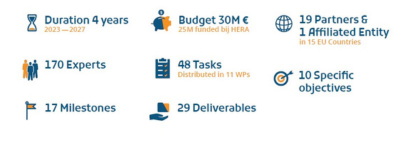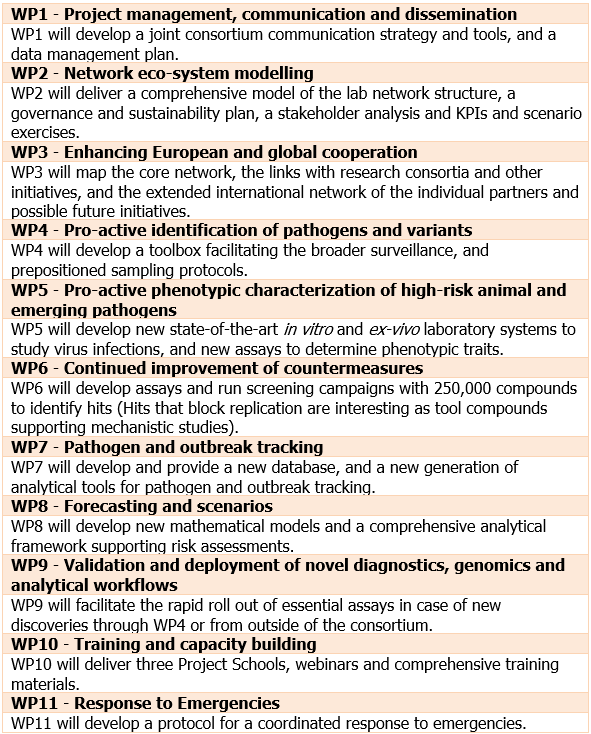Progetti di ricerca
Durable

DURABLE
Delivering a Unified Research Alliance of Biomedical and public health Laboratories against Epidemics is a multinational, EU-backed research project running from February 1, 2023, to January 31, 2027. The project supports the activity of HERA (Health Environment Research Agenda for Europe) developing coordinated strategies and tools all across Europe in response to increased outbreaks of infectious diseases. The University of Padua (UNIPD) is a partner of the DURABLE projetc and the research activities are coordinated by Professor Luisa Barzon at the Department of Molecular Medicine (DMM).
DURABLE in figures

About the project
Project period: 1/2/2023 – 31/1/2027
Outbreaks of infectious diseases are increasing due to multiple local and global interaction changes disrupting the fragile balance of the complex human-animal-environment ecosystem. The increased frequency and complexity of health threats require a different, unified form of preparedness and a coordinated, fast, reliable and effective emergency response.
DURABLE is a tailored solution to this recognised need - a strong network of world-class basic and translational research institutes and public health centres across Europe with an outstanding track record in public health support with global reach. DURABLE aims to provide high-quality scientific information in record time to support HERA’s decision-making in preparing for and responding to cross-border health threats and assessing the impact of countermeasures.
DURABLE will coordinate a global collaboration, from pathogen detection, evolutionary analysis and threat characterisation, with One Health approach, to data and information collection and sharing, for optimal threat response. DURABLE is a unique multidisciplinary consortium with complementary expertise to meet this challenge and build productive interactions with HERA and other stakeholders.
Due to their outstanding track record and experience in the field, the DURABLE consortium is competent from day one. DURABLE will develop and validate a roadmap for rapid deployment of key countermeasures, test the robustness of the network, and assess key aspects of its emergency mode when simulating or dealing with identified threats. Additionally, DURABLE will focus on long-term sustainability by focusing on capacity building, training the next generation of researchers and developing pandemic preparedness training modules for the network and beyond.
Project objectives
- DURABLE will be a one-stop shop for diagnostics, research, preparedness and response to current and future health threats for the benefit of citizens in the EU and worldwide.
- DURABLE will establish a sustainable network of laboratories and research institutes that can address the barriers of better preparedness, and provide alerts, real-time scientific data and integrated analyses to HERA.
- DURABLE will:
- Develop and use both non-targeted and targeted methods for identification of known and new threats
- Coordinate, integrate, analyse and share the output for rapid and direct use in public health decision making
- Develop targeted studies to guide further evidence gathering in response to alerts
Expected results of the Work Packages (WPs)

DURABLE is co-funded by the European Union

Partners and affiliated Entities
1. Institut Pasteur (IP) France
1.1 Pasteur Network (PN)
2. Katholieke Universiteit Leuven (KU LEUVEN) Belgium
3. Statens Serum Institut (SSI) Denmark
4. Friedrich Loeffler Institut - Bundesforschungsinstitut fuer Tiergesundheit (FLI) Germany
5. Charite - Universitaetsmedizin Berlin (CHARITE) Germany
6. Erasmus Medisch Centrum Rotterdam (EMC) Netherlands
7. Partikas Drosibas, Dzivnieku Veselibas un Vides Zinatniskais Institutsbior (BIOR) Latvia
8. Universite d’Aix Marseille (AMU) France
9. Rijksinstituut voor Volksgezondheid en Milieu (RIVM) Netherlands
10. Universita Degli Studi di Padova (UNIPD) Italy
11. Uniwersytet Jagiellonski (JU) Poland
12. Agencia Estatal Consejo Superior de Investigaciones Cientificas (CSIC) Spain
13. Helsingin Yliopisto (UH) Finland
14. Aristotelio Panepistimio Thessalonikis (AUTH) Greece
15. Instituto Nacional de Saúde Dr. Ricardo Jorge (INSA) Portugal
16. Univerzita Karlova (CU) Czech Republic
17. Istituto Superiore di Sanità (ISS) Italy
18. Tartu Ulikool (UTARTU) Estonia
19. Hrvatski Zavod za Javno Zdravstvo (CIPH) Croatia
Progetto finanziato con il PR Veneto FESR 2021-2027

PROGETTO FINANZIATO CON IL PR Veneto FESR 2021-2027
Asse 1 – Ricerca, sviluppo e innovazione
Azione 1.1.1 “Rafforzare la ricerca e l’innovazione (in collaborazione) tra imprese e organismi di ricerca” Sub A “Rafforzare la ricerca e l’innovazione tra imprese e organismi di ricerca”
Titolo: Tecnologie Intelligenti per la Medicina di Innovazione. INTELLI-MI
Progetto:
Il progetto presentato dalla RIR Tech4Life, attraverso l’integrazione di tecnologie intelligenti avanzate, ha l’obiettivo di migliorare l’efficienza e la sostenibilità del settore Health, garantendo al tempo stesso soluzioni personalizzate e sicure al per migliorare l’esperienza del paziente e l’efficienza delle strutture sanitarie.
Grazie alla stretta collaborazione tra 9 aziende del Veneto e le Università di Padova, Verona e Ca’ Foscari di Venezia verranno realizzati Sistemi Intelligenti a diverse scale di intervento, che coprono l’intero spettro dal micro (omiche, biologia molecolare) al “macro” (sistemi informativi, robotica), senza trascurare gli aspetti normativi e la conformità alla regolamentazione.
I docenti del Dipartimento di Medicina Molecolare, svolgendo regolarmente attività assistenziale, metteranno a disposizione del progetto la loro esperienza e know-how sullo sviluppo e validazione di procedure diagnostiche. L'attività di ricerca si concentrerà sulla ottimizzazione di un prototipo di strumento automatizzato in grado di processare autonomamente il campione biologico sino al risultato, senza intervento di personale tecnico, riducendo rischi di errore umano e di contaminazione. Il prototipo sarà testato in un condizioni analoghe a quelle degli utilizzatori finali per cui il prototipo è progettato.
Valore progettuale: 2.557.022,54 €, contributo a fondo perduto 1.199.917,22 €, finanziamento agevolato 378.506,20€





